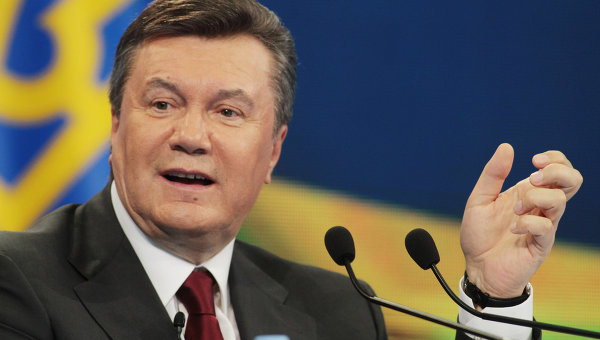
West Fears Ukrainian Election Will Not Be Democratic
Publication: Eurasia Daily Monitor Volume: 9 Issue: 186
By:

Ukraine will be at a crossroads after the parliamentary election scheduled for October 28. There are signs that this election will not be as free and fair as the previous elections in 2006 and 2007, as the ruling Party of Regions (PRU) has not resisted the temptation to abuse the vast administrative resources under its control. If the West does not recognize the election as honest, US and EU sanctions are likely to follow, the European Union will not sign the association and free trade agreement, which was initialed earlier this year, and Ukraine may be sucked back into Russia’s orbit.
Recent opinion polls show that the PRU and its allies will most probably win the election (ukraine-elections.com.ua). Even if they do not, President Viktor Yanukovych will not be obliged to dismiss the government, according to the 1996 constitution, which was brought back to life by the pro-Yanukovych Constitutional Court in 2010. The election process will be more important than the outcome this time. After the imprisonment of former Prime Minister Yulia Tymoshenko a year ago, which angered the West, this election will be the last chance for Yanukovych and the PRU to convince the West that Ukraine shares democratic values. First Deputy Prime Minister Valery Khoroshkovsky has said the priority would be to persuade the West to recognize the election. He admitted this would be an uphill struggle because Ukraine’s image has already been spoilt—thus, observers expect violations a priori (Ukrainska Pravda, September 19).
The EU has said a free and fair election will be one of the three conditions for holding a Ukraine-EU summit this year, the other two being steps to redress the effects of selective justice applied to Tymoshenko and her allies, as well as steps to reform the economy (Ukrinform, September 11). If there is no summit, the association agreement will not be signed next year. The US State Department said it expects that Ukraine will adhere to its obligation to conduct an honest election on October 28 (liga.net, October 1). US Assistant Secretary of State for Public Affairs Michael Hammer said Ukraine should free Tymoshenko and hold a democratic election. He called on Ukraine to follow the recent example of the Georgian elections (Interfax-Ukraine, October 4).
The closer the election, the more concern is being expressed by observers. The European Network of Election Monitoring Organizations (ENEMO) has warned that the Central Electoral Commission (CEC) and district commissions lack transparency in their decision making, that those candidates who break laws often go unpunished, and that administrative resources are misused and attempts to buy votes are observed (Channel 5, September 27). Canadian observers also noted many instances of indirect vote buying and of administrative resources being abused such as using government infrastructure and funds from the state budget for campaigning purposes (Interfax-Ukraine, October 2). On the upside, ENEMO’s mission welcomed the Ukrainian CEC’s moves to restrict massive voter migration between districts and to use web cameras at polling stations (Channel 5, September 27).
Local experts agreed in a survey conducted by the Democratic Initiatives foundation that the PRU has wielded the largest administrative resources and resorted to dirty campaign tricks more often than its rivals (UNIAN, October 1). Former parliament speaker Oleksandr Moroz gave examples of such tricks used in his single-mandate district in Kyiv Region in a letter to Yanukovych. He complained that police and the tax authorities intimidated his election agents and his election posters were regularly damaged, the regional governor openly instructed his subordinates to ensure a victory for a pro-government candidate, residents of one village were told that their only school would be closed if they did not vote for the pro-government candidate, while the pro-government candidate was openly buying votes, which the governor called “investment” (Ukrainska Pravda, October 3).
Yanukovych apparently does not understand the seriousness of the accusations against his team. He said at a recent meeting with Ukrainian diplomats that all the parties and candidates acted under equal conditions in the campaign. Yanukovych admitted that some violations did take place, but he explained them away as “emotions [which are] a human factor” (UNIAN, October 3). The EU and the US will hardly be satisfied with this explanation if the election is botched. But Russia is likely to recognize any outcome of the election, especially after it praised the September 23 election in neighboring Belarus, which also failed to meet Western standards of freedom and fairness (Belta, September 25). Sergei Markov, a Russian pro-Kremlin analyst, has predicted that Russia would recognize the Ukrainian election. He also said that although Russia believes that Tymoshenko’s imprisonment was an error, errors are unavoidable in democracies as young as Ukraine (Segodnya, October 8).
It took the PRU several years to make a choice between free trade with the EU and a customs union with Russia, Belarus and Kazakhstan, in favor of the former. However, if the upcoming election is not honest and causes the EU to refuse to sign the free trade agreement, the Ukrainian government will hardly have a choice but to accept the Russian invitations to join the Customs Union. A failure to join either of the two economic groupings would be fatal for Ukraine’s export-oriented economy. Yet, the choice Kyiv ultimately makes between the two will also have dramatic socio-political consequences in the long run.




